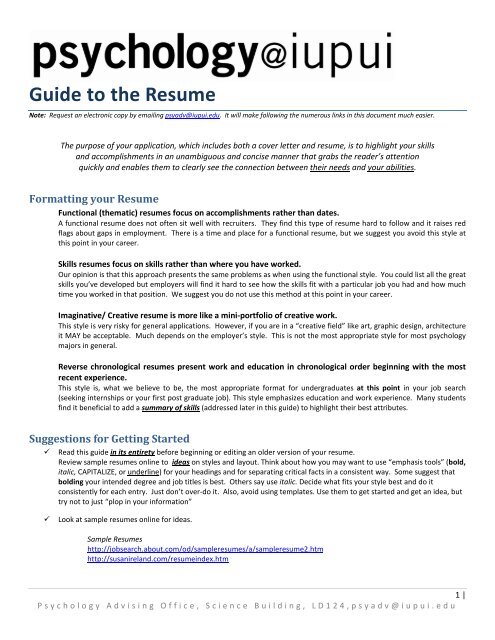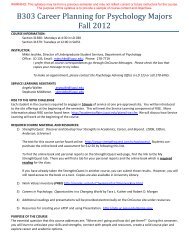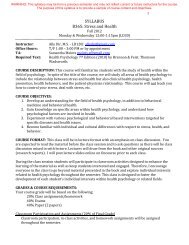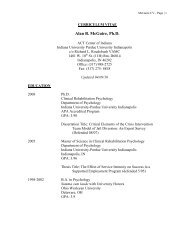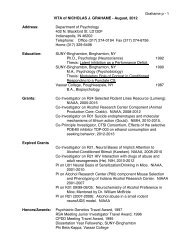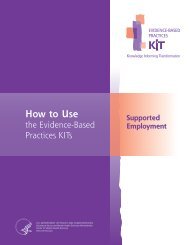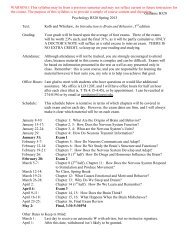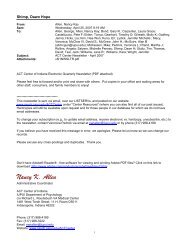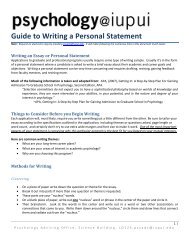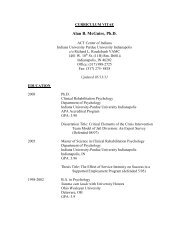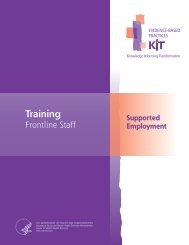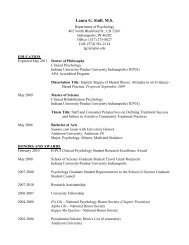Guide to the Resume - Psychology @ IUPUI
Guide to the Resume - Psychology @ IUPUI
Guide to the Resume - Psychology @ IUPUI
You also want an ePaper? Increase the reach of your titles
YUMPU automatically turns print PDFs into web optimized ePapers that Google loves.
<strong>Guide</strong> <strong>to</strong> <strong>the</strong> <strong>Resume</strong><br />
Note: Request an electronic copy by emailing psyadv@iupui.edu. It will make following <strong>the</strong> numerous links in this document much easier.<br />
The purpose of your application, which includes both a cover letter and resume, is <strong>to</strong> highlight your skills<br />
and accomplishments in an unambiguous and concise manner that grabs <strong>the</strong> reader’s attention<br />
quickly and enables <strong>the</strong>m <strong>to</strong> clearly see <strong>the</strong> connection between <strong>the</strong>ir needs and your abilities.<br />
Formatting your <strong>Resume</strong><br />
Functional (<strong>the</strong>matic) resumes focus on accomplishments ra<strong>the</strong>r than dates.<br />
A functional resume does not often sit well with recruiters. They find this type of resume hard <strong>to</strong> follow and it raises red<br />
flags about gaps in employment. There is a time and place for a functional resume, but we suggest you avoid this style at<br />
this point in your career.<br />
Skills resumes focus on skills ra<strong>the</strong>r than where you have worked.<br />
Our opinion is that this approach presents <strong>the</strong> same problems as when using <strong>the</strong> functional style. You could list all <strong>the</strong> great<br />
skills you’ve developed but employers will find it hard <strong>to</strong> see how <strong>the</strong> skills fit with a particular job you had and how much<br />
time you worked in that position. We suggest you do not use this method at this point in your career.<br />
Imaginative/ Creative resume is more like a mini-portfolio of creative work.<br />
This style is very risky for general applications. However, if you are in a “creative field” like art, graphic design, architecture<br />
it MAY be acceptable. Much depends on <strong>the</strong> employer’s style. This is not <strong>the</strong> most appropriate style for most psychology<br />
majors in general.<br />
Reverse chronological resumes present work and education in chronological order beginning with <strong>the</strong> most<br />
recent experience.<br />
This style is, what we believe <strong>to</strong> be, <strong>the</strong> most appropriate format for undergraduates at this point in your job search<br />
(seeking internships or your first post graduate job). This style emphasizes education and work experience. Many students<br />
find it beneficial <strong>to</strong> add a summary of skills (addressed later in this guide) <strong>to</strong> highlight <strong>the</strong>ir best attributes.<br />
Suggestions for Getting Started<br />
Read this guide in its entirety before beginning or editing an older version of your resume.<br />
Review sample resumes online <strong>to</strong> ideas on styles and layout. Think about how you may want <strong>to</strong> use “emphasis <strong>to</strong>ols” (bold,<br />
italic, CAPITALIZE, or underline) for your headings and for separating critical facts in a consistent way. Some suggest that<br />
bolding your intended degree and job titles is best. O<strong>the</strong>rs say use italic. Decide what fits your style best and do it<br />
consistently for each entry. Just don’t over-do it. Also, avoid using templates. Use <strong>the</strong>m <strong>to</strong> get started and get an idea, but<br />
try not <strong>to</strong> just “plop in your information”<br />
Look at sample resumes online for ideas.<br />
Sample <strong>Resume</strong>s<br />
http://jobsearch.about.com/od/sampleresumes/a/sampleresume2.htm<br />
http://susanireland.com/resumeindex.htm<br />
1 |<br />
<strong>Psychology</strong> Advising Office, Science Building, LD124,psyadv@iupui.edu
http://www.google.com/imageshl=en&rlz=1T4ADRA_enUS379US380&q=sample+resumes&um=1&ie=UTF-<br />
8&source=univ&ei=kXIOTLrXMcH38AaknOmaCQ&sa=X&oi=image_result_group&ct=title&resnum=4&ved=0CEIQs<br />
AQwAw<br />
Make it easy <strong>to</strong> read by using bullet points<br />
Carefully consider how information is organized (most important information should be at <strong>the</strong> <strong>to</strong>p)<br />
Keep in mind that <strong>the</strong> <strong>to</strong>p 1/3 of your resume is <strong>the</strong> “hot zone” and may be <strong>the</strong> only information read before someone<br />
makes an initial judgment on whe<strong>the</strong>r <strong>to</strong> read more or <strong>to</strong> move on <strong>to</strong> <strong>the</strong> next. Try opening your resume on your computer<br />
screen…what do you see without scrolling Does it make you want <strong>to</strong> read more You have about 15 seconds <strong>to</strong> make a<br />
good impression.<br />
If you are sending your application electronically, read all <strong>the</strong> submission instructions carefully. If possible you may want <strong>to</strong><br />
send a Word version and a PDF version of your resume & cover letter. Remember, if <strong>the</strong>y can’t open it <strong>the</strong>y won’t read it.<br />
Decided on your section headings based on <strong>the</strong> s<strong>to</strong>ry you want <strong>to</strong> tell and <strong>the</strong> position you are applying for. What<br />
categories fit with your experiences For example, you may want a section titled “Related Experience” for <strong>the</strong> experiences<br />
you’ve had, both paid and unpaid, that relate most <strong>to</strong> <strong>the</strong> job you’re applying for. Then, you may have a section called<br />
“O<strong>the</strong>r Work Experience” for your jobs as a server or bartender. Depending on your experiences, you may add sections like<br />
Awards and Honors, Service, Clubs and Organizations, Presentations, Publications or Research Experience. The question<br />
you need <strong>to</strong> answer is: What have I done that will make me stand out <strong>to</strong> this employer Generally speaking, don’t create<br />
ano<strong>the</strong>r section if you don’t have more than one entry <strong>to</strong> add.<br />
Create your resume and cover letter in Microsoft Word (industry standard)<br />
Don’t use a resume template. Do your own formatting <strong>to</strong> avoid problems when formatting down <strong>the</strong> road - it will save you<br />
hours of headache later. It also makes for a more original resume ra<strong>the</strong>r than <strong>the</strong> same old tired templates.<br />
DON’T use headers and footers or complicated formatting- keep it simple.<br />
Use “emphasis <strong>to</strong>ols” (bold, italic, CAPITALIZE, or underline) <strong>to</strong> separate critical facts in a consistent way (but don’t over-do<br />
it).<br />
Avoid abbreviations (except states) – even <strong>IUPUI</strong> should be spelled out.<br />
Use phrases and not full sentences<br />
ALWAYS avoid writing in <strong>the</strong> first or third person (I did this… or We did that…)<br />
Keep <strong>to</strong> 1-2 pages (nothing over)<br />
Keep font <strong>to</strong> 10 <strong>to</strong> 12 point<br />
One font should be used throughout <strong>the</strong> entire resume (exception: you can use a different font for your letterhead that is<br />
different from but compliments <strong>the</strong> rest of your resume)<br />
If you are printing your resume use 8 ½ by 11 paper (print with a high quality printer on high quality resume paper- 20#)<br />
Use simple fonts like Calibri, Tahoma, Palatino, Arial, Corbel (10 point Arial was a recruiter favorite)<br />
Name your resume document with your name. Example: JeschkeMikkiresume.doc. The reason is so that a recruiter, who<br />
may receive 100’s of applications, can easily find your resume by your last name<br />
No pictures or graphics (exception: use a horizontal line <strong>to</strong> separate your letterhead or sparingly <strong>to</strong> separate sections of<br />
your resume)<br />
When creating your letterhead DO NOT USE UNDERLINE <strong>to</strong> separate your letterhead from <strong>the</strong> rest of your resume, use <strong>the</strong><br />
Horizontal Line. In Word go <strong>to</strong> Insert/Shapes, choose <strong>the</strong> line and draw it in, and adjust <strong>the</strong> thickness <strong>to</strong> your liking<br />
Make it eye appealing by balancing information and white space on <strong>the</strong> page and aligning lines of information consistently<br />
(pay attention <strong>to</strong> each indent and tab)<br />
Within each section, be sure that information is presented in reverse chronological order beginning with <strong>the</strong> most recent.<br />
And, always include <strong>the</strong> dates of employment (or dates of involvement if it’s a club or service activity)<br />
DO NOT include high school information and jobs on your resume. The exception is if <strong>the</strong> event you want <strong>to</strong> record was so<br />
significant (exchange student in Spain) or <strong>the</strong> job was very closely aligned <strong>to</strong> <strong>the</strong> job you’re trying <strong>to</strong> acquire<br />
Proofread and Get Feedback<br />
The #1 Pet Peeve of Recruiter surveyed by <strong>Resume</strong>Doc<strong>to</strong>r.com was SPELLING ERRORS, TYPOS, AND POOR<br />
GRAMMAR!!!!<br />
PROOF-READ YOUR RESUME!!!! For an employer, lack of attention <strong>to</strong> detail on your resume translates in<strong>to</strong> lack of<br />
attention <strong>to</strong> detail on <strong>the</strong> job! If <strong>the</strong>re are erroneous errors that your word processor picks up, right click on <strong>the</strong> word or<br />
phrase and select “ignore all” so that <strong>the</strong> reader does not see a lot of green and red underlines.<br />
2 |<br />
<strong>Psychology</strong> Advising Office, Science Building, LD124,psyadv@iupui.edu
Get feedback from o<strong>the</strong>rs. Use your parents, family, friends, current supervisor, faculty advisor, and career services<br />
professionals. Keep in mind that when you ask for feedback, you are going <strong>to</strong> get it and you will get conflicting<br />
information. This is YOUR resume and it should reflect YOU. Take in<strong>to</strong> consideration <strong>the</strong> suggestions you get and if you<br />
are unsure, pass it by a career services professional you trust and decide what’s best for you and your industry.<br />
Letterhead<br />
Brand yourself by creating a letterhead that reflects you. This should include complete and accurate contact<br />
information. You can have a little style here, but don’t go <strong>to</strong>o crazy. Make your name stand out on <strong>the</strong> page by using<br />
bold, all caps and a larger font size. Include a phone number that you actually answer. Some employers, in a rush <strong>to</strong><br />
hire, don’t take <strong>the</strong> time <strong>to</strong> leave voice mails. NOTE: Be sure <strong>to</strong> check your voice mail message recording. Is it<br />
professional, hammy, or worse, inappropriate<br />
Example 1<br />
Mikki Jeschke<br />
555 Getajob Street<br />
Indianapolis, IN 46202<br />
Phone: 317-555-5555<br />
Email: me@hotmail.com<br />
This format is kind of<br />
boring! Your name<br />
should stand out.<br />
Example 2<br />
Mikki Jeschke<br />
555 Getajob Street • Down<strong>to</strong>wn, IN 46202 • Phone: 317-555-5555 • email: mjeschke@iupui.edu<br />
Example 3<br />
Style is okay, but change<br />
<strong>the</strong> font. It’s <strong>to</strong>o hard <strong>to</strong><br />
read! AND, get a new<br />
email address!!<br />
Mikki Jeschke<br />
555 Getajob Street<br />
Indianapolis, In 46202<br />
Phone: 317-555-5555<br />
Email: imhot@hotmail.com<br />
Use your letterhead for <strong>the</strong> <strong>to</strong>p of your cover letter, thank you notes, reference page and any o<strong>the</strong>r correspondence you<br />
have with a potential employer or men<strong>to</strong>r. DO NOT include all of this “letterhead” information on <strong>the</strong> second page of<br />
your resume (if you have a second page). Simply place your name and page information on page 2. This is helpful <strong>to</strong> an<br />
employer (and <strong>to</strong> you) if your resume and o<strong>the</strong>rs go flying on<strong>to</strong> <strong>the</strong> floor. The employer can easily put yours back<br />
<strong>to</strong>ge<strong>the</strong>r (where it may have just gone in <strong>the</strong> trash). Your second page heading should look something like this:<br />
Example 1<br />
Mikki Jeschke, page 2 of 2<br />
Example 2<br />
Mikki Jeschke, page 2 of 2<br />
3 |<br />
<strong>Psychology</strong> Advising Office, Science Building, LD124,psyadv@iupui.edu
Objective Statement<br />
Use an Objective Statement at <strong>the</strong> <strong>to</strong>p of your resume when you are NOT using a cover letter. Example:<br />
Career/Internship Fair or if your submitting online and <strong>the</strong>y do not accept a cover letter. Typically this is <strong>the</strong> first thing<br />
an employer reads on your resume.<br />
An Objective should enable <strong>the</strong> reader <strong>to</strong> clearly see <strong>the</strong> type of position you seek and <strong>the</strong> connection between <strong>the</strong>ir<br />
needs and your abilities. Use <strong>the</strong> job ad <strong>to</strong> map your skills <strong>to</strong> what <strong>the</strong>y are looking for in a strong candidate. A poor<br />
objective statement is usually one written with only <strong>the</strong> job seeker in mind and not what <strong>the</strong> job seeker can do <strong>to</strong> “solve<br />
<strong>the</strong> employer’s problem.” When you write an objective statement think about what can you do <strong>to</strong> fill <strong>the</strong> void in <strong>the</strong>ir<br />
company<br />
How do you write a strong Objective Statement First, it is helpful <strong>to</strong> answer some of <strong>the</strong> following questions.<br />
The following information was adapted from <strong>the</strong> OWL Online Writing Lab at Purdue University<br />
http://owl.english.purdue.eduworkshops/hypertext/<strong>Resume</strong>@/objective.html.<br />
Questions <strong>to</strong> ask yourself<br />
What are my main qualifications (strengths, skills, area of<br />
expertise)<br />
What positions (or range of positions) do I seek<br />
What are my professional goals<br />
What type of organization or work setting am I interested in<br />
Which of my qualifications are most desired by this employer<br />
What position titles (or range of positions) are available<br />
What are some goals of <strong>the</strong> organizations that I’m interested in<br />
What types of organizations or work setting are now hiring<br />
Be specific<br />
The most common mistake made in writing objective statements is being <strong>to</strong>o general and vague in describing ei<strong>the</strong>r <strong>the</strong><br />
position desired or your qualifications. For example, some objective statements read like this: An internship allowing me<br />
<strong>to</strong> utilize my knowledge and expertise in different areas.<br />
Such an objective statement raises more questions than it answers: What kind of internship What knowledge What<br />
kinds of expertise Which areas Be as specific as possible in your objective statement <strong>to</strong> help your readers see what<br />
you have <strong>to</strong> offer “at a glance.”<br />
Common Approaches<br />
If you know you want <strong>to</strong> emphasize…<br />
A specific position (or two) and your main<br />
relevant qualifications<br />
The field or type of organization you want<br />
<strong>to</strong> work in AND your professional goal OR<br />
your main qualifications<br />
You might experiment with one or more<br />
of <strong>the</strong>se formats<br />
A position as [name or type or position]<br />
allowing me <strong>to</strong> use my [qualifications]…<br />
To apply my [qualifications] as a [position<br />
title]...<br />
An opportunity <strong>to</strong> [professional goal] in a<br />
[type of organization, work environment<br />
or field]…<br />
To enter [type of organization, work<br />
environment or field] allowing me <strong>to</strong> use<br />
my [qualifications]…<br />
Samples<br />
A position as a Case Manager allowing me<br />
<strong>to</strong> use my knowledge of psychology and<br />
experience in human services <strong>to</strong> serve<br />
people with developmental disabilities.<br />
An opportunity <strong>to</strong> obtain an entry level<br />
human resource position, with eventual<br />
advancement <strong>to</strong> training and<br />
development in a not for profit.<br />
To join a research team allowing me <strong>to</strong><br />
apply my knowledge and interests in<br />
research methodology, statistics and <strong>the</strong><br />
biological sciences.<br />
4 |<br />
<strong>Psychology</strong> Advising Office, Science Building, LD124,psyadv@iupui.edu
Your professional or career goal OR an<br />
organizational goal<br />
To [professional goal]…<br />
To help children and families in troubled<br />
situations by utilizing my child protection<br />
services background.<br />
An opportunity <strong>to</strong> [professional goal]…<br />
A specific position desired [Position Name]. Technical writer specializing in user<br />
documentation.<br />
Whichever method you choose, be sure when you read it you clearly see how you will help <strong>the</strong> employer. Remember, employers<br />
have a problem <strong>the</strong>y need <strong>to</strong> solve – that is why <strong>the</strong>y are hiring. Can you solve <strong>the</strong>ir problem<br />
Some variations <strong>to</strong> try<br />
• Integrate key words and phrases used in <strong>the</strong> job advertisement (s)<br />
• Avoid clichés, platitude, and tired expressions like “hard worker,” “excellent communica<strong>to</strong>r”<br />
• Play with word choices <strong>to</strong> fit your strengths and your readers’ expectations. You might try<br />
o Substituting for “use” words like “develop”, “apply”, or “employ”, etc.<br />
o Replacing “allowing me” with “requiring” or “giving me <strong>the</strong> opportunity”, etc<br />
o Changing “enter” <strong>to</strong> “join”, “pursue”, “obtain”, “become a member”, “contribute”, etc.<br />
• Blend two or more of <strong>the</strong> above generic models or create your own!<br />
Summary of Skills<br />
When not using an objective statement, create a Summary of Skills section (or Skills Profile, Summary of Qualifications<br />
etc.) that enables <strong>the</strong> reader <strong>to</strong> clearly see <strong>the</strong> connection between <strong>the</strong>ir needs and your abilities. So, <strong>to</strong> do this<br />
correctly, you must first know what skills and abilities you have learned or developed through your experiences and <strong>the</strong><br />
skills and abilities <strong>the</strong> employer is seeking (look for this in <strong>the</strong> job ad).<br />
Here is method you can use <strong>to</strong> develop your statement. As you respond <strong>to</strong> each section be certain <strong>to</strong> relate it back <strong>to</strong><br />
<strong>the</strong> KEY WORDS found in <strong>the</strong> job ad/description.<br />
START WITH:<br />
Who you are and what can you achieve<br />
For example: Highly competent psychology major with experience assisting disabled young adults with social skills and<br />
time management.<br />
OR<br />
Who you are and what can you do<br />
For example: <strong>Psychology</strong> major with a passion for helping victims of domestic abuse. Experience with successfully<br />
assisting <strong>to</strong> manage a multimillion dollar fundraising campaign.<br />
THEN ADD:<br />
Identify your area of knowledge or expertise.<br />
For example: <strong>Psychology</strong> major with concentration in clinical psychology and extensive work and volunteer experience<br />
with drug and alcohol abuse programs.<br />
OR<br />
What are your greatest strengths<br />
For example: Leadership, communicate with groups, teach, build productive teams.<br />
OR<br />
What are your technical skills<br />
For example: Demonstrated skills in research methods, accurately tracking and analyzing data using SPSS and Excel, and<br />
successfully assisting in <strong>the</strong> execution of multiple aspects of a research project.<br />
OR<br />
What are you unique or specific qualifications<br />
For example: Bachelors of <strong>Psychology</strong> (anticipate, 2010), CPR certified.<br />
5 |<br />
<strong>Psychology</strong> Advising Office, Science Building, LD124,psyadv@iupui.edu
Complete summary statement examples:<br />
Highly competent psychology major with experiences assisting disabled young adults with social skills and time<br />
management. Utilize effective communication, interpersonal, and research skills <strong>to</strong> successfully create original<br />
programming for teaching life skills, building rapport, and accurately documenting interactions. CPR certified.<br />
<strong>Psychology</strong> major with a concentration in Industrial Organizational <strong>Psychology</strong> and one year of experience<br />
working as an intern in a human resources office. Successfully completed independent research project on <strong>the</strong><br />
<strong>to</strong>pic of stereotyping in <strong>the</strong> workplace. Strong leadership skills, team oriented worker, excellent communica<strong>to</strong>r,<br />
and well developed research skills.<br />
<strong>Psychology</strong> major with a passion for helping victims of domestic abuse. Experience with successfully assisting <strong>to</strong><br />
manage a multimillion dollar fundraising campaign. Excellent managerial and budgeting skills, excellent<br />
fundraiser, and strong communica<strong>to</strong>r.<br />
<strong>Psychology</strong> major with a concentration in clinical psychology and volunteer experience with drug and alcohol<br />
abuse programs. Demonstrated skills in research methods, accurately tracking and analyzing data using SPSS<br />
and Excel, and successfully assisting in <strong>the</strong> execution of many components of a research project.<br />
There are many ways <strong>to</strong> “summarize” who you are and what you have <strong>to</strong> offer <strong>the</strong> employer. The trick is doing it<br />
eloquently, succinctly, and in a way that demonstrates that you are <strong>the</strong> answer <strong>to</strong> <strong>the</strong>ir “problem.” This takes a lot of<br />
time <strong>to</strong> develop. Have your advisors, men<strong>to</strong>rs, friends and family review this and give you feedback.<br />
Tips on Developing Better Skill Phrases<br />
How <strong>to</strong> move from A B<br />
Action Verb + Skill/Benefit<br />
1. Think of an action verb<br />
2. Think of a skill of benefit that you<br />
a. Have used<br />
b. Have gained or acquired<br />
c. Or that you will offer<br />
Results<br />
3. Now ask yourself:<br />
a. How did I gain or use this skill<br />
b. Why<br />
c. For what reason<br />
d. Or <strong>to</strong> what extent<br />
Examples of Quality Skill Phrases<br />
Enhanced (1) + communication skills (2) by working one on one with students <strong>to</strong> develop better studying techniques (3).<br />
Developed (1) + skills in time management (2) by prioritizing tasks in order <strong>to</strong> increase productivity by 27% (3)<br />
Trained horses (1 + 2) for private cus<strong>to</strong>mers and achieved a large client pool by serval satisfied cus<strong>to</strong>mers’ referrals (3).<br />
www.uwrf.edu/career<br />
Education<br />
We believe that <strong>the</strong> Education section should be next because it is one of your strongest selling point in this season of<br />
your life. Add content <strong>to</strong> this section that shows off your academic strengths. Here is an example of what this might<br />
look like.<br />
6 |<br />
<strong>Psychology</strong> Advising Office, Science Building, LD124,psyadv@iupui.edu
Example 1 (good)<br />
Education<br />
Indiana University Purdue University Indianapolis, Indianapolis, IN<br />
Bachelor of Science in <strong>Psychology</strong> Anticipated May 2009<br />
Related Course Work: xxxxxx, xxxxxx, xxxxxx, xxxxxxx<br />
(Write out <strong>the</strong> full name of course and don’t list everything- just <strong>the</strong> ones most relevant <strong>to</strong> <strong>the</strong> job you’re applying <strong>to</strong>)<br />
Example 2 (better)<br />
Education<br />
Indiana University Purdue University Indianapolis, Indianapolis, IN<br />
Bachelor of Science in <strong>Psychology</strong>- expected date of graduation, May 2009<br />
Track concentration: Industrial Organizational <strong>Psychology</strong><br />
Minor: Business<br />
GPA: 3.6/4.0<br />
Honors: Dean’s list 2007- present<br />
Earned and financed 80% of college and living expenses<br />
Relevant Coursework: xxxxx, xxxxx, xxxxx, xxxx<br />
You have some flexibility in deciding what <strong>to</strong> include- Example 1 is <strong>the</strong> minimum. Moving <strong>to</strong>ward Example 2 is better.<br />
Notice how we spelled out Indiana University Purdue University Indianapolis ra<strong>the</strong>r than writing <strong>IUPUI</strong>. It’s more<br />
professional looking and <strong>the</strong>re are people out <strong>the</strong>re who don’t really know what <strong>IUPUI</strong> is. Notice how we used bolds,<br />
italic, and font size <strong>to</strong> draw attention <strong>to</strong> information. Notice how we use indents. Bullets can also be used <strong>to</strong> separate<br />
information (but be cautious about over using bullets).<br />
If you don’t have a track concentration or minor, that’s okay. If your GPA is not above a 3.5, it’s not <strong>the</strong> end of <strong>the</strong><br />
world- simply don’t put it here. At this stage in your career life, having some relevant courses listed might build your<br />
case for having knowledge and skills that an employer is interested in seeing. This is especially true if you lack <strong>the</strong> work<br />
experience in <strong>the</strong> field you are trying <strong>to</strong> enter. If you have been awarded some academic awards or scholarships, you<br />
can decide if it’s best <strong>to</strong> place it here or in ano<strong>the</strong>r category called Awards and Recognitions, for example. If you’re<br />
financing your education fully or in part, you can let <strong>the</strong> reader know. This demonstrates a strong desire <strong>to</strong> get an<br />
education and, if you’re doing well, a variety of o<strong>the</strong>r skill sets (time management, multitasking, commitment <strong>to</strong> goal,<br />
organized, etc).<br />
NOTE: If you’ve attended multiple campuses, <strong>the</strong> rule of thumb is <strong>to</strong> only list <strong>the</strong>m if you attained a degree or<br />
certification <strong>the</strong>re. O<strong>the</strong>rwise you can leave it off. Remember <strong>to</strong> also leave off any high school information at this point<br />
in your career.<br />
Take a moment <strong>to</strong> list some of <strong>the</strong> key things you want <strong>to</strong> include in your education section:<br />
7 |<br />
<strong>Psychology</strong> Advising Office, Science Building, LD124,psyadv@iupui.edu
Experience<br />
List all <strong>the</strong> jobs you’ve had since high school:<br />
List any of <strong>the</strong> clubs and/or activities you are involved in (at <strong>IUPUI</strong>, at your place of worship, in your community, etc):<br />
List any of <strong>the</strong> volunteer or community service activities you’ve participated in (even if just for <strong>the</strong> day):<br />
List any scholarships, awards, and recognitions you have received:<br />
List local, regional, or national professional organizations or affiliations related <strong>to</strong> your career area of interests:<br />
Based on what you’ve recorded above, think about what o<strong>the</strong>r categories you will have on YOUR resume.<br />
Here’s a list of common headers:<br />
• Experience, Work Experience, Employment Experience, Relevant Experience, (more specific) Human<br />
Resource Experience, O<strong>the</strong>r Experience<br />
• Volunteer Experience, Community Service Experience, Community Activities<br />
8 |<br />
<strong>Psychology</strong> Advising Office, Science Building, LD124,psyadv@iupui.edu
• Activities, Clubs and Organizations, Memberships<br />
• Objective, Skills Profile, Skills, Related Skills and Training, (or more specifically), Language Skills, Computer<br />
Skills<br />
• OTHER IDEAS: Awards and Recognitions, Presentations and Publications, Research Experience, Professional<br />
Affiliations<br />
WORK EXPERIENCE: (or whatever you choose <strong>to</strong> call this) is where you will bring <strong>the</strong> reader’s attention <strong>to</strong> <strong>the</strong> paid or<br />
unpaid experiences you have had. These should be listed in reverse chronological order. Begin by giving key facts about<br />
<strong>the</strong> experience- name of <strong>the</strong> company, your title or position, <strong>the</strong> location, and dates you worked. Then note <strong>the</strong> key<br />
skills you gained and most importantly your accomplishments. It’s okay if your work experience is not directly related <strong>to</strong><br />
what you’re now pursuing. Students can have rich experiences in retail and food/beverage services. If you take any job<br />
seriously <strong>the</strong>re are a number of skill sets you can develop and identify on your resume. We call <strong>the</strong>se Transferable Skills<br />
(See <strong>Guide</strong> <strong>to</strong> Transferable Skills). Consider this: Have you trained o<strong>the</strong>r employees, been promoted, or managed<br />
o<strong>the</strong>rs Have you developed a policy or procedure that made operations run more smoothly Have you been<br />
recognized for outstanding sales, service or some o<strong>the</strong>r work accomplishment Find meaningful ways <strong>to</strong> develop<br />
yourself in ANY job or experience you have- it will serve you well in <strong>the</strong> future.<br />
When describing <strong>the</strong> skills and accomplishments for each experience, you should use ACTION STATEMENTS. Action<br />
verbs should lead <strong>the</strong> sentence, phrase, or bullet point. These statements should give your reader a better picture of<br />
what you have <strong>to</strong> offer <strong>the</strong>ir company. When constructing your ACTION STATEMENT, consider <strong>the</strong> “what” and <strong>the</strong> “so<br />
what.” AND always double check your use of word tense. If you are presently working in <strong>the</strong> job, use present tense. If<br />
you had <strong>the</strong> job in <strong>the</strong> past, use past tense.<br />
Example:<br />
Developed an office database<br />
(This represents <strong>the</strong> “what”)<br />
Better Example:<br />
Developed a database that allowed staff of twenty <strong>to</strong> share client contact information.<br />
(This represents <strong>the</strong> “so what”)<br />
Here are two links <strong>to</strong> terrific web pages with lists of Action Verbs. Find more by doing a Google search for Action Verbs<br />
for <strong>Resume</strong>s. http://www.writeexpress.com/action-verbs.html AND http://www.quintcareers.com/action_skills.html<br />
are our favorites.<br />
Practice Writing Action Statements<br />
Consider one of <strong>the</strong> jobs you listed earlier and complete <strong>the</strong> following:<br />
My Job Facts: (Name of <strong>the</strong> company, position/title, city/state, dates of employment – do not list your work<br />
supervisors)<br />
9 |<br />
<strong>Psychology</strong> Advising Office, Science Building, LD124,psyadv@iupui.edu
Now list skills/accomplishment/ duties:<br />
Now take <strong>the</strong> Skills/Accomplishments/Duties and create bulleted action statements, using ACTION VERBS, <strong>to</strong> describe<br />
<strong>the</strong> experience <strong>to</strong> an employer. We recommend 3-5 bullets depending on <strong>the</strong> importance (how it relates <strong>to</strong> what you’re<br />
applying <strong>to</strong>) and <strong>the</strong> scope (did you have varied responsibilities that require more bullets) of <strong>the</strong> job. Remember <strong>to</strong><br />
consider <strong>the</strong> “what” and <strong>the</strong> “so what.” Put <strong>the</strong> bullets in order of importance (lead with <strong>the</strong> best stuff). If you can<br />
quantify your accomplishment (presented <strong>to</strong> twenty people, raised $3500) it makes your statement more powerful.<br />
Two important things <strong>to</strong> consider when writing <strong>the</strong>se statements: 1) Now is not <strong>the</strong> time <strong>to</strong> be shy about your<br />
accomplishments. 2) Now is not <strong>the</strong> time <strong>to</strong> inflate <strong>the</strong> truth. This can be <strong>the</strong> most time consuming part of developing<br />
your resume. This may take several drafts <strong>to</strong> get it right. SEEK FEEDBACK!!!<br />
The following section is taken from <strong>the</strong> Monroe community College www.monroecc.edu/go/careercenter, Action<br />
statements for a <strong>Resume</strong>.<br />
Keep <strong>the</strong>se things in mind when writing your action statements.<br />
• These should be short, clearly written phrases.<br />
• Use <strong>the</strong> minimum number of words necessary <strong>to</strong> convey accurate information.<br />
• Select words that will mean something <strong>to</strong> <strong>the</strong> person who will read your resume.<br />
• Avoid introduc<strong>to</strong>ry phrases such as “my duties included” or I was in charge of.”<br />
• List accomplishments whenever possible ra<strong>the</strong>r than just describe duties.<br />
• Always keep <strong>the</strong> needs of your employer in mind (refer <strong>to</strong> <strong>the</strong> job ad).<br />
Here are some examples of how <strong>to</strong> create more accomplishment-oriented statements.<br />
PASSIVE ACTIVE ACCOMPLISHMENT-ORIENTED<br />
Duties included teaching art lessons.<br />
Prepared and displayed creative art<br />
activities.<br />
Prepared creative art activities,<br />
increased students’ interest and<br />
abilities. Awarded four blue ribbons<br />
at District Art Show.<br />
10 |<br />
<strong>Psychology</strong> Advising Office, Science Building, LD124,psyadv@iupui.edu
PASSIVE ACTIVE ACCOMPLISHMENT- ORIENTED<br />
Cus<strong>to</strong>mer Service<br />
Provided cus<strong>to</strong>mer service for bank<br />
services<br />
Provided cus<strong>to</strong>mer service through<br />
resolution of problems, explanation<br />
of bank service and policies, and<br />
knowledge of financial planning,<br />
resulting in greater cus<strong>to</strong>mer<br />
satisfaction.<br />
PASSIVE ACTIVE ACCOMPLISHMENT- ORIENTED<br />
Department Manager<br />
Managed department and recruited<br />
participants.<br />
Staffed and managed a 20-30 person<br />
department that recruited participate<br />
for marketing research studies. Cut<br />
cost by one-third in less than six<br />
months.<br />
PASSIVE ACTIVE ACCOMPLISHMENT- ORIENTED<br />
Responsible for clerical duties.<br />
Assisted supervisor with<br />
clerical/office procedures <strong>to</strong> save<br />
time.<br />
Successfully developed and<br />
implemented systems <strong>to</strong> streamline<br />
office procedures, increasing<br />
productivity.<br />
Practice writing your own accomplishment-oriented action statements:<br />
11 |<br />
<strong>Psychology</strong> Advising Office, Science Building, LD124,psyadv@iupui.edu
Activities or Volunteer Experience is ano<strong>the</strong>r common area that student have on <strong>the</strong>ir resume. Depending on how<br />
many “activities” you have, you may combine or create separate categories. Here are some examples of how you can<br />
identify <strong>the</strong>se activities.<br />
Examples:<br />
Activities<br />
<strong>Psychology</strong> Club, <strong>IUPUI</strong>, Department of <strong>Psychology</strong><br />
member fall 2008- present<br />
Regularly participate in bi-monthly meetings, serve on organization committee <strong>to</strong> fundraise for a local charity, serve as club<br />
treasurer (spring 2009).<br />
Service Activities<br />
Angels Wings, Indianapolis, IN<br />
from spring 2009 <strong>to</strong> present<br />
Volunteered 5 hours a week at a local women’s shelter. Performed initial intake paperwork for new clients and provided child<br />
care as needed while mo<strong>the</strong>rs were meeting with <strong>the</strong>ir counselor.<br />
Volunteer Experience<br />
Angels Wings Women’s Shelter, Indianapolis, IN winter 2009<br />
Volunteered for a day at a local Wal-Mart <strong>to</strong> help collect <strong>to</strong>ys for children who are victims of domestic violence. Collected over<br />
100 <strong>to</strong>ys in 4 hours.<br />
Key points for this section:<br />
• Be sure <strong>to</strong> give <strong>the</strong> name of <strong>the</strong> organization and where it’s located.<br />
• Provide <strong>the</strong> dates that you were active.<br />
• If you can, create a brief summary of what you accomplished through membership or involvement.<br />
• If your involvement in a club/ group or service project was significant and ongoing, and <strong>the</strong> skills and<br />
accomplishments you used/developed relate directly <strong>to</strong> <strong>the</strong> job you are applying for, consider whe<strong>the</strong>r or not it<br />
deserves a higher spot on your resume (under Related Experience).<br />
• Quantify if you can. “Raised $3500 in 6 months for…”<br />
References<br />
There is no need <strong>to</strong> put “References Available Upon Request” on your resume. It’s just space filler. Instead create a<br />
Reference page that has your letterhead at <strong>the</strong> <strong>to</strong>p and format <strong>the</strong> reference information in a similar style <strong>to</strong> your<br />
resume. NEVER list your parents (or o<strong>the</strong>r family member), your pas<strong>to</strong>r or your <strong>the</strong>rapist <strong>to</strong> serve as a reference – your<br />
references should be people who can speak <strong>to</strong> your work or academic experience (supervisor or professor). When<br />
requesting a reference from someone, always ask if <strong>the</strong> person can give you a strong verbal or written reference.<br />
Have this Reference page ready at <strong>the</strong> interview if it’s requested, or ready <strong>to</strong> email/mail when requested later. Here’s a<br />
sample of one way <strong>to</strong> format a reference page:<br />
Mikki Jeschke<br />
555 Getajob Street • Down<strong>to</strong>wn, IN 46202 • Phone: 317-555-5555 • email: mjeschke@iupui.edu<br />
REFERENCES<br />
Joe Smith<br />
Company Name<br />
Title<br />
555 Referme Street<br />
Indianapolis, IN 46202<br />
Phone: 317-555-5555<br />
Email: me@hotmail.com<br />
Suzy Smith<br />
Company Name<br />
Title<br />
555 Referme Street<br />
12 |<br />
<strong>Psychology</strong> Advising Office, Science Building, LD124,psyadv@iupui.edu
Indianapolis, IN 46202<br />
Phone: 317-555-5555<br />
Email: me@hotmail.com<br />
Jim Smith<br />
Company Name<br />
Title<br />
555 Referme Street<br />
Indianapolis, IN 46202<br />
Phone: 317-555-5555<br />
Email: me@hotmail.com<br />
13 |<br />
<strong>Psychology</strong> Advising Office, Science Building, LD124,psyadv@iupui.edu


